- Home
- Jennifer Niven
Becoming Clementine: A Novel
Becoming Clementine: A Novel Read online
A PLUME BOOK
BECOMING CLEMENTINE
JENNIFER NIVEN’S two previous novels are Velva Jean Learns to Fly and Velva Jean Learns to Drive, which was chosen as an Indie Reader’s Group “Top Ten” Pick. Niven has also written three nonfiction books. The Ice Master was named one of the top ten nonfiction books of the year by Entertainment Weekly, has been translated into eight languages, has been the subject of several documentaries, and received Italy’s Gambrinus “Giuseppe Mazzotti” Literary Prize. Ada Blackjack was a Book Sense “Top Ten” Pick and has been optioned for the movies and translated into Chinese, French, and Estonian. The Aqua-Net Diaries, a memoir about her high school experiences, was optioned by Warner Bros. as a television series. She lives in Los Angeles. For more information, visit jenniferniven.com or follow her on Facebook.
* * *
Praise for Becoming Clementine
“Becoming Clementine is a spirited tale of courage, honor, and loyalty. Jennifer Niven succeeds in not only illuminating an important and little-known role played by women during the war, but creating an unforgettable and heartfelt story that will resonate with readers far and wide.”
—Pam Jenoff, author of The Diplomat’s Wife
“Jennifer Niven has thrust Velva Jean into the realm of unconventional warfare. This is the gripping tale of a young woman surviving a plane crash in Nazi-occupied France, only to find herself in the perilous world of the French underground. It’s all here—intrigue, romance, heroism. A terrifically absorbing read.”
—Will Irwin, author of The Jedburghs and Abundance of Valor
“Reading this splendid novel allowed me to vicariously share wartime adventures with a sister spy. Velva Jean had everything that was required of us operatives in OSS (Office of Strategic Services), a forerunner of the CIA. She had the courage to survive undercover behind enemy lines in constant danger. She carried out life-threatening orders without question and bravely faced capture. Becoming Clementine is a spellbinding spy saga.”
—Elizabeth P. McIntosh, OSS/CIA, and author of Sisterhood of Spies
“Richly textured, historically evocative, emotionally mesmerizing, Becoming Clementine takes you on a journey through World War II France so gripping you can smell the gun smoke. Niven’s deft prose transports readers on a finely blended internal and external voyage, where Velva Jean’s physical adventures are as engrossing as her emotional exploration.”
Kerry Reichs, author of What You Wish For and Leaving Unknown
“Niven has done something I didn’t think was possible. She has topped Velva Jean Hart’s first two stirring adventures with a third that is an epic—powerful, gripping, tragic, romantic, and inspiring. Becoming Clementine is a page-turner of a story, with its riveting, insightful, on-the-ground perspectives of World War II. The time, the place, and the events are as authentic as Velva Jean herself. Spellbinding.”
—James Earl Jones, Tony Award–winning, Emmy Award–winning actor
“Jennifer Niven has done it again! In Niven’s third adventure featuring this courageous female pilot, Velva Jean persuades the RAF to use her in flying intelligence agents to France, where she crash lands and is rescued by the Resistance. Her arrest by the Gestapo and her heroic triumph over the horrors of war (as well as her moving romance with a French agent) makes Becoming Clementine a riveting, ‘can’t put it down,’ must read.”
—Dr. Margaret S. Emanuelson, veteran of OSS and author of Company of Spies
“In Velva Jean’s latest adventure, cloak-and-dagger buffs will recognize and appreciate Niven’s artful and knowing introduction of tradecraft—techniques used to carry out covert operations. Hiding local currency in shoulder pads. Miniature compasses designed to look like dress buttons. Lethal knives built into shoe and boot heels. All are actual examples of tradecraft utilized by covert agents staging missions behind the lines during World War II. As a collector of ‘spy gadgets,’ and as a fan and student of real-life female agents, I found Niven’s authentic application of tradecraft a hidden gift in the espionage thriller that is Becoming Clementine. Read it for the intriguing tale and the intriguing tradecraft.”
—Linda McCarthy, founding curator of the CIA Museum
Praise for Velva Jean Learns to Fly
“An endearing portrait of a young woman with a big heart—Velva Jean Learns to Fly illuminates the power of going after a dream and the courage it takes to never let go.”
—Beth Hoffman, bestselling author of Saving CeeCee Honeycutt
“Velva Jean’s story delves into the contributions made by amazing women during World War II and tells a compassionate story about adventure, love, and war. This is a wonderful book—very hard to put down.”
—Ann Howard Creel, author of The Magic of Ordinary Days
“I devoured Velva Jean Learns to Fly and immediately began spreading the word: This one is not to be missed!”
—Cassandra King, author of The Same Sweet Girls
“Velva Jean Hart is a heroine with grit, grace, determination, and enough humanity to hook readers with ferocious tenderness, making them want to find and befriend her. Niven’s writing shines.”
——Booklist (starred review)
“A sweeping adventure that takes the reader from the streets of Nashville to the belly of a WWII bomber.”
—Benjamin Percy, award-winning author of The Wilding and Refresh, Refresh
“In this fun, fast-paced, heartwarming sequel to Velva Jean Learns to Drive, we follow the beloved young heroine from her mountain home to Nashville. But soon after Pearl Harbor is attacked, Velva Jean begins singing a new song—one full of patriotism, courage, and feisty independence. The perfect read for any girl of any age who yearns to soar beyond her dreams.”
—Susan Gregg Gilmore, author of The Improper Life of Bezellia Grove and Looking for Salvation at the Dairy Queen
Praise for Velva Jean Learns to Drive
“A touching read, funny and wise, like a crazy blend of Loretta Lynn, Dolly Parton, a less morose Flannery O’Connor, and maybe a shot of Hank Williams... Niven makes some memorable moon-spun magic in her rich fiction debut.”
—Publishers Weekly (starred review)
“In this story Jennifer Niven creates a world long gone, a mountain past where people suffer failure, loss, and betrayal, as well as the strength and joy of connection and deep love. Velva Jean Learns to Drive takes us far into this soaring, emotional country, the place where our best music comes from.”
—Robert Morgan, author of Gap Creek
“A fluid storyteller.”
—Wall Street Journal
“Velva Jean learns to... not only drive, but to soar. This beautifully written coming-of-age story captivated me, and I recommend it to anyone who has ever longed to ‘live out there.’”
—Ann B. Ross, author of the bestselling Miss Julia novels
“Spirited.”
—Parade
JENNIFER NIVEN
Becoming
Clementine
A PLUME BOOK
PLUME
Published by the Penguin Group
Penguin Group (USA) Inc., 375 Hudson Street, New York, New York 10014, U.S.A. • Penguin Group (Canada), 90 Eglinton Avenue East, Suite 700, Toronto, Ontario, Canada M4P 2Y3 (a division of Pearson Penguin Canada Inc.) • Penguin Books Ltd., 80 Strand, London WC2R 0RL, England • Penguin Ireland, 25 St. Stephen’s Green, Dublin 2, Ireland (a division of Penguin Books Ltd.) • Penguin Group (Australia), 250 Camberwell Road, Camberwell, Victoria 3124, Australia (a division of Pearson Australia Group Pty. Ltd.) • Penguin Books India Pvt. Ltd., 11 Community Centre, Panchsheel Park, New Delhi – 110 017, India • Penguin Group (NZ), 67 Apollo Drive, Rosedale, Auckland 0
632, New Zealand (a division of Pearson New Zealand Ltd.) • Penguin Books (South Africa) (Pty.) Ltd., 24 Sturdee Avenue, Rosebank, Johannesburg 2196, South Africa
Penguin Books Ltd., Registered Offices: 80 Strand, London WC2R 0RL, England
First published by Plume, a member of Penguin Group (USA) Inc.
First Printing, October 2012
10 9 8 7 6 5 4 3 2 1
Copyright © Jennifer Niven, 2012
All rights reserved
Photo of Jack F. McJunkin Sr. on p. 343 courtesy of Jennifer Niven.
REGISTERED TRADEMARK—MARCA REGISTRADA
LIBRARY OF CONGRESS CATALOGING-IN-PUBLICATION DATA
Niven, Jennifer.
Becoming Clementine / Jennifer Niven.
p. cm.
ISBN: 978-1-101-60344-4
1. World War, 1939–1945—France—Fiction. 2. Intelligence service—Fiction.
3. War stories. gsafd I. Title.
PS3614.I94B43 2012
813’.6—dc23 2012010157
Printed in the United States of America
Set in Granjon LT Std and Park Avenue Std • Designed by Eve L. Kirch
Without limiting the rights under copyright reserved above, no part of this publication may be reproduced, stored in or introduced into a retrieval system, or transmitted, in any form, or by any means (electronic, mechanical, photocopying, recording, or otherwise), without the prior written permission of both the copyright owner and the above publisher of this book.
PUBLISHER’S NOTE
This is a work of fiction. Names, characters, places, and incidents are either the product of the author’s imagination or are used fictitiously, and any resemblance to actual persons, living or dead, business establishments, events, or locales is entirely coincidental.
The scanning, uploading, and distribution of this book via the Internet or via any other means without the permission of the publisher is illegal and punishable by law. Please purchase only authorized electronic editions, and do not participate in or encourage electronic piracy of copyrighted materials. Your support of the author’s rights is appreciated.
BOOKS ARE AVAILABLE AT QUANTITY DISCOUNTS WHEN USED TO PROMOTE PRODUCTS OR SERVICES. FOR INFORMATION PLEASE WRITE TO PREMIUM MARKETING DIVISION, PENGUIN GROUP (USA) INC., 375 HUDSON STREET, NEW YORK, NEW YORK 10014.
ALWAYS LEARNING
PEARSON
For Louis,
my Colonel Brandon
He is the kindest and best of men.
—Jane Austen
Where there is doubt, faith.
Where there is despair, hope.
Where there is darkness, light.
Where there is sadness, joy.
—The Prayer of St. Francis
Acknowledgments
Flannery O’Connor said, “Writing a novel is a terrible experience, during which the hair often falls out and the teeth decay.”
Because writing really can be a terrible—and lonely—experience, it helps to have support. Or, more accurately, life support.
I couldn’t have written this book without:
My mother, Penelope Niven—fellow writer, mentor, cheerleader, commiserator, cohort in over-jubilation, Bachelor-watcher, and best friend.
My home team—Louis Kapeleris, love of my life, and our three literary kitties: Satchmo, Rumi, and last, but never ever least, Lulu, all of whom spent hours by my side while I was writing. Special thanks to Louis for spending long weekends helping me sort out the plot, index card by index card, and for continually reminding me I could do this.
My unparalleled literary agent, John Ware, who is not only a terrific agent and one of the very best people I know, but one of my dearest and most cherished friends.
My superb and savvy editor, Carolyn Carlson, who knows and cares for Velva Jean almost as much as I do, and who once again worked editorial magic. And the wonderful folks at Penguin/Plume who have given Velva Jean such a good home: Amanda Brower, Milena Brown, Elizabeth Keenan, Ashley Pattison, Clare Ferraro, Kathryn Court, Phil Budnick, John Fagan, Kym Surridge, Lavina Lee, and Howard Wall, not to mention the marvelous sales team. Heartfelt thanks also to art director Jaya Miceli and Elena Giavaldi, designer of the gorgeous cover.
The OSS Society and its president Charles Pinck, Roy Tebbutt and the Carpetbagger Aviation Museum, Linda McCarthy, founding curator of the CIA Museum, Dr. Margaret Emanuelson (former spy!), and others who are mentioned in greater detail at the end of this book for their invaluable contributions to the story.
Joe Kraemer, for much-needed fun and best friendship, Angelo Surmelis, Ed Baran, Lisa Brucker and Peter Mervis, Dan and Magda Dillon, Gay Diller McGee, Gloria McGee Hope, Lynn Duval Clark, the entire von Sprecken clan, Terri Day McJunkin, Florence Moore (who sent me a package of family history and letters, including one written by my grandmother that appears in the afterword of this book), Gayle McJunkin, and the rest of my family and friends, too numerous to name. I love them, each and every one. (Pay close attention, Learyn and Annalise—I have written you into these pages….)
My early readers—Mom, Louis, and friend and fellow writer Valerie Frey Stone. Also Will Irwin, for his counsel and expertise regarding Special Forces, Special Operations, and the military; John Thomas, my consultant on all things World War II; Dan Dillon, my expert on all things flying; Michael Hoppé; Darren Thorpe; Marie Toma of Playclothes Vintage Fashions; and musician and kindred spirit Briana Harley, who has so beautifully brought Velva Jean’s songs to life, and whose song “Live Out There” (lyrics cowritten with my mother) appears at the end of the book.
Rachel Sheeley Muzzillo, Frances Owens Draughn, James Fleming, and Briana Harley for coming up with ideas for supercool spy weapons, code names, and, most important, lipsticks.
Mary Duff, surrogate cat mom.
Physique 57 and Bootcamp LA (led by Jay and Marcella Kerwin), which got me away from my desk so I could not only exercise but clear my head.
And, last, my literary inspirations: Flannery O’Connor, Shirley Jackson, Harper Lee, Ernest Hemingway, the Brontë sisters, and my mother, who taught me to “live out there.”
Contents
~ 1944 ~
PART ONE
“A Distant Land to Roam”
~ 1944 ~
PART TWO
“Sunshine in the Shadows”
The Story Behind the Story
Resources
1944
PART ONE
Fare you well (fare you well)
So I left my dear old home….
—“A Distant Land to Roam”
ONE
Somewhere over the Atlantic Ocean, we flew into a cloud bank. The weather had been nice as could be from Greenland to Iceland, and from Iceland it was nothing but blue skies and calm winds. The closer we got to Great Britain, the more the sky changed, going suddenly gray, then dark gray, then a darker gray, then black.
They said the B-17 had mythical powers, that it was magic because it could defend itself, even with the pilot knocked cold and no one at the wheel, and that it could return home even if it was blown apart. It was the fiercest fighter of the war, the Flying Fortress, a daylight precision bomber that flew smooth for being so big and heavy—as smooth as Three Gum River, back home in North Carolina, on a sunny, cloudless day. But now I had to hold on tight to the wheel and the throttle to keep the plane from dropping or turning or rattling away from me.
I was going to be the second woman in history to pilot a bomber across the Atlantic Ocean. I was dressed in my Santiago Blues, the official uniform of the WASP, or Women Airforce Service Pilots, with a smart little hat and a fitted navy skirt designed by Bergdorf Goodman in New York, and I had a .45 pistol strapped to my hip. I was flying a crew of eleven, and three of those were girls—Helen Stillbert, who was also a WASP, and my friend Beryl Goss, or Gossie, who was serving in the Women’s Army Corps, and me. Helen sat in the copilot’s seat. She was going to fly the B-17 back across the ocean on our return.
Suddenly, th
e bomber shuddered and for one second I wondered if we’d been hit. It rocked and rolled side to side, and just then, I didn’t care about being the second woman in history. The only thing I cared about was getting to Scotland in one piece because I was on a secret mission: I was on my way to Europe to find my brother Johnny Clay.
I climbed up and up, pushing the B-17 heavenward through the winds and the fog because the thermals were usually calmer the higher you flew. Thermals were giant trees of air that rose above the earth, caused by the change in temperature. I climbed higher, right up into the thunderclouds. I was flying almost blind, so I dropped a bit, trying to get below the winds. In my headset, I could hear Helen saying, “Can’t we get above these clouds, Hartsie?” She sounded cross—and scared.
Johnny Clay had gone missing, and the only person who knew I was planning to find him was me. I didn’t have a clue in the world where he was, but the last letter I had from him was dated October 18, 1943, from a base in England. Johnny Clay was a paratrooper with the 101st Airborne. His unit had made the jump on the Normandy coast on June 6, a little over a week ago, but Johnny Clay hadn’t jumped with them, and no one could tell me why or where he was. Over three hundred thousand troops had landed or gone ashore along a fifty-mile stretch of beach to fight the Germans. I knew Johnny Clay better than anyone, and if there was one thing I knew for certain, nothing on earth—not a gold mine stuffed fat with gold or our own dear mama herself, come down from heaven—would have kept him from jumping out of that plane on D-day.
Suddenly, the B-17 dropped twenty-five hundred feet, knocking the breath right out of me. It was the heart-in-the-throat, stomach-in-the-knees feeling of free falling, the same feeling I’d had practicing parachute landings from a platform at Avenger Field in Sweetwater, Texas, where I learned to be a WASP. I could see the dark blue-black of the ocean below me, and clouds overhead and on all sides closing in tighter and tighter on the B-17, as if they were trying to smother the life right out of us.

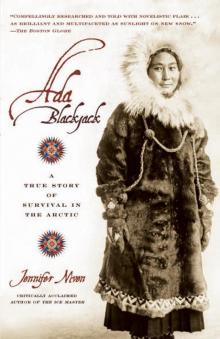 Ada Blackjack: A True Story of Survival in the Arctic
Ada Blackjack: A True Story of Survival in the Arctic The Aqua Net Diaries: Big Hair, Big Dreams, Small Town
The Aqua Net Diaries: Big Hair, Big Dreams, Small Town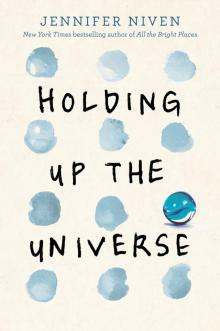 Holding Up the Universe
Holding Up the Universe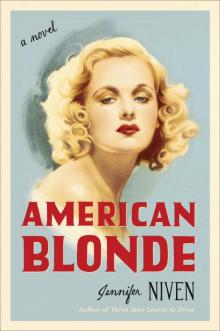 American Blonde
American Blonde All the Bright Places
All the Bright Places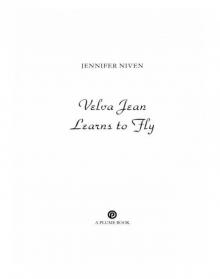 Velva Jean Learns to Fly
Velva Jean Learns to Fly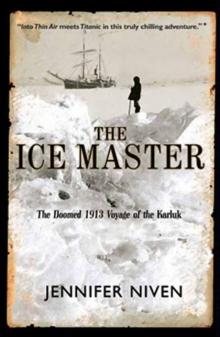 The Ice Master
The Ice Master Breathless
Breathless The Aqua Net Diaries
The Aqua Net Diaries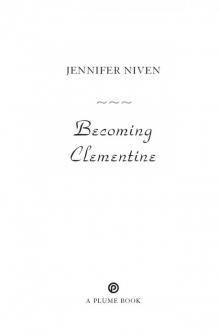 Becoming Clementine: A Novel
Becoming Clementine: A Novel